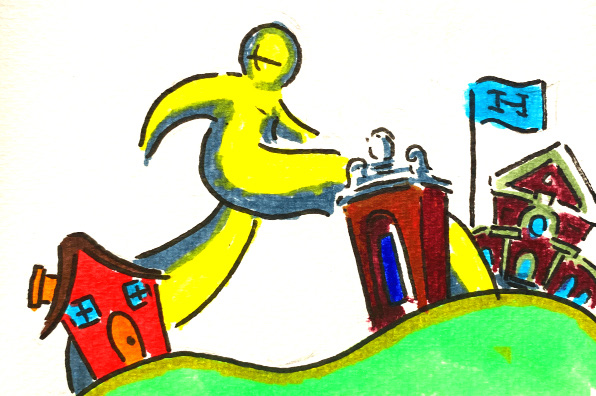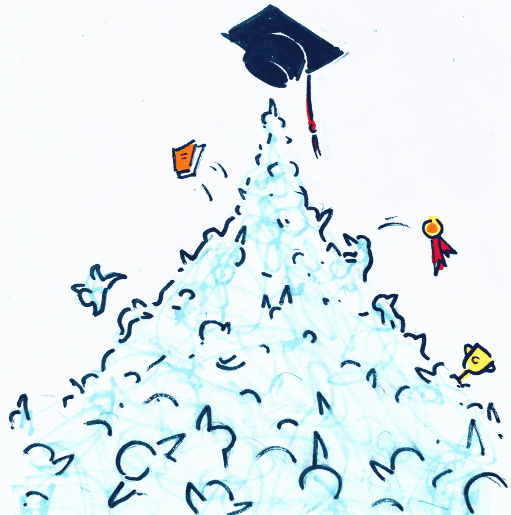Before Hotchkiss, I went to a school right across the street from my building in Lower Manhattan. That meant my mom could greet me at home five minutes after I left my last class. I never even got to experience the subway rides home where New York City students contemplate the meaning of life (often while half-asleep).
But my closeness to my parents wasn’t due to the proximity of my school. I play golf, and it would have been impossible to navigate the urban jungle for practices and tournaments without my parents chauffeuring me everywhere. Even my music kept me tethered to them; my mom was my only violin teacher until I arrived at Hotchkiss.
As an only child with no siblings to share the weight of my parents’ hopes and anxieties, their constant presence made me feel one thing: I had to get out. Not that I wasn’t grateful for their unconditional love and devotion, but it felt unfair for a 14 year-old to be the emotional center of someone’s universe and feel responsible for holding it all together. Thus began my journey to Hotchkiss.
To improve the odds of escaping without blowing up my family’s delicate ecosystem, I leaned on every excuse I could find—from golf (“it’s hard to do college recruiting from the city!”) to overcrowding at my old school (which forced me into a deeply-dreaded Spanish class instead of my beloved French). Any reason would do, so long as I didn’t have to confront them with the truth: I was tired of carrying the weight of being an only child at home.
Looking back, my mom wasn’t totally honest either when she agreed to let me apply to Hotchkiss, and that was made clear on the day I received my acceptance. Instead of the wide smile or joyous scream I had pictured, the stunned look on her face betrayed the sadness she was feeling. I think deep down, she was hoping Hotchkiss would be the bad guy and tell me that I had to stay home. She later told me she didn’t want to be “that parent,” telling her kid not to do something they really wanted.
The first few months here turned out to be nothing like I expected. Despite hoping I had escaped my parents, I got constant texts, FaceTime calls, and frequent visits. I reacted the way most teenagers would: I ignored the calls, left texts unanswered, and fabricated tests and assignments to keep them from showing up.
But then something strange happened during my first winter. I got sick. A lot. It felt like I was catching every virus making its rounds on campus. I spent more time in the Health Center than in the classroom, and my initial excitement gave way to a sickly depression. During this period, the first face I thought of was my mom’s.
After all the tricks I’d pulled to push her away, I felt like a hypocrite asking her to come and help me. I still remember the call. As if she had forgotten all my antics from the past few months, she immediately went into super-mom mode, rattling off a list of things I needed. I’ll never forget the purpose and motherly care in her voice that day.
There’s no denying that distance changed things for my family. My mom gave up performing the violin after I was born, choosing to teach instead because it gave her a more predictable schedule. Now, with more time on her hands, she’s performing solo and playing in orchestras again—her true passions—and I’m genuinely excited for her.
As for me, distance has allowed me to see my parents differently. I’ve come to realize that they’re doing their job in the best way they know how. I even appreciate things I used to find invasive or burdensome. Our regular calls serve as a backup to my Google Calendar reminders and keep me on top of my work. I also enjoy their occasional visits—especially when my laundry hamper is throwing up dirty socks and I can ask them to take a load home.
Don’t get me wrong—I still feel the weight of being an only child. But now I understand that my parents derive so much of their purpose—and even their sense of self—from being my parents, and that’s not something I can ignore, even if it feels overwhelming at times.
Being an only child means I don’t get to share my responsibility to my parents. I don’t get to roll my eyes and tell them to go bother my brother or sister. While that used to frustrate me, I’ve come to see it differently now. It’s a role I didn’t choose, but one I’ve grown into.
I want independence, but I also want to do right by my parents. Hotchkiss has helped me achieve both.





